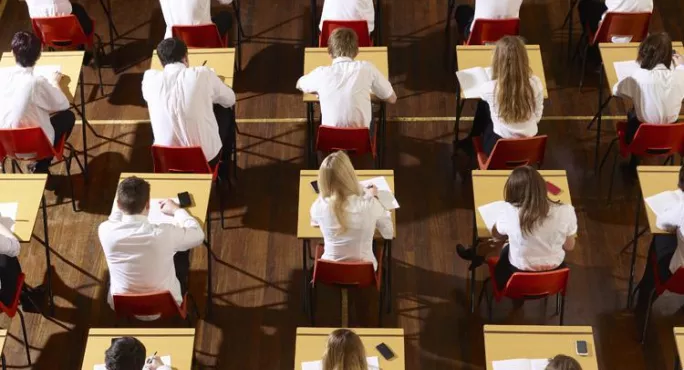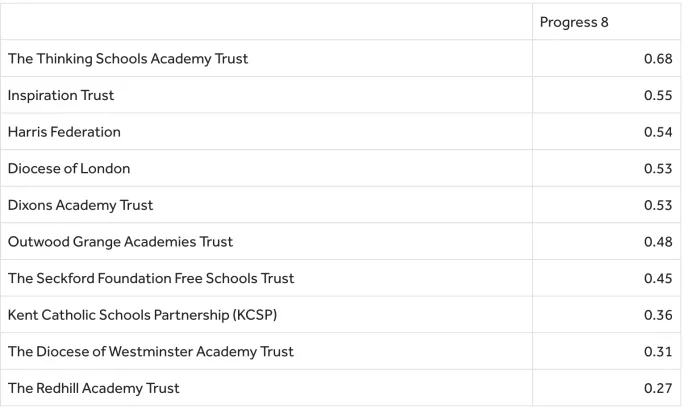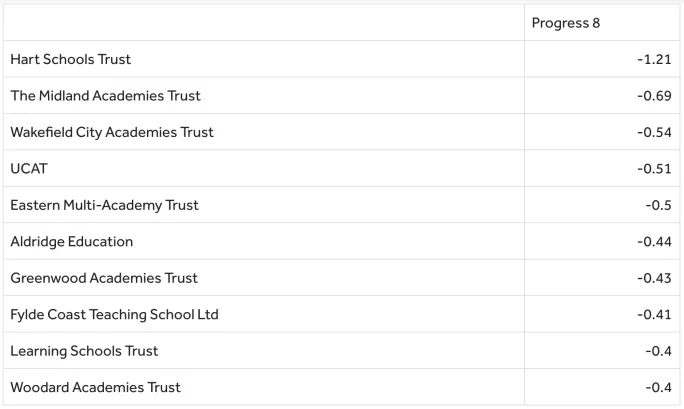
- Home
- League tables: LIVE
League tables: LIVE

15:10
15:10
School leaders will have had sleepless nights worrying about the league tables out today - but they don’t matter as much as you’d think, writes ASCL leader Geoff Barton.
12:30
12:30
Lord Jim Knight, chief education and external officer at digital education company, Tes Global, the parent company of Tes, says: “Today’s results contain within them a warning sign for the schools sector. We are on the cusp of a major shortage of teachers in English secondary schools, caused by the number leaving the profession and a coming surge in secondary pupil numbers.says:
“The most recent Tes Recruitment Index, found indications as far back as Easter 2017 that schools are accepting lower quality staff in core EBacc subjects, such as English and Maths. If we are seeing this flow through into challenging results, alarm bells need to be ringing. The whole sector needs to work together to attract graduates into the profession because every child needs a great teacher, if they are to achieve their potential.”
12:01
12:01
Free schools are the best performing type of secondary schools on the government’s preferred Progress 8 measure, new figures have shown.
The 53 free schools included in today’s GCSE league tables had an average Progress 8 score of 0.15 last year.
Today’s statistical release from the DfE warns that the numbers of free schools “are too small to allow robust conclusions to be drawn about their performance at the end of key stage 4, or compare between years”.
11:47
11:47
Paul Whiteman, general secretary of NAHT, says that trying to draw any meaningful conclusions from the performance tables is like comparing apples with pears.
“Comparing one year with another, or one group of schools with another, is precarious at best when the very basis of measurement is different each time. While data such as school league tables can be useful, there are no ‘health warnings’ given about the numbers published and there should be. In a year of such unprecedented changes to GCSEs, these kinds of comparisons are particularly unjust and unreliable.
“There are further years of uncertainty to come as the rest of the reformed subjects are implemented and we then need a significant period of stability in the system. Until we’ve seen all of the reforms implemented, those who seek to hold schools to account should refrain from cracking the whip. Support rather than sanction is the appropriate path to take.”
11:44
11:44
Geoff Barton, general secretary of the Association of School and College Leaders, says: “Today’s secondary school performance tables cannot be compared with previous years because the government has once again moved the goalposts. The new 9-1 grading system for GCSE English and maths has complicated the way in which the headline measures of school performance are calculated, with Attainment 8 and Progress 8 having to be worked out using a combination of 9-1 grades and the old A*-G grades.
“It is particularly frustrating that the bar for achievement in English and maths has been raised arbitrarily to a grade 5 under the new system, which is higher than the old standard of grade C. And it is potentially baffling for parents and employers that schools are now judged on grade 5 - described as a ‘strong pass’ - while grade 4 is good enough to be deemed a ‘standard pass’.
“Our message to the DfE, trust boards, governors and inspectors is to avoid leaping to judgement on the basis of these performance tables. They only tell us a limited amount about the true quality of a school. It is a system which is undergoing significant change and which will continue to be turbulent in summer 2018 with the next phase of new-style GCSEs.”
11:38
11:38
Russell Hobby, CEO of Teach First, says: “While many schools have shown progress today thanks to the dedication and talent of the staff and students, behind today’s league tables is the uncomfortable reality that the field is tilted against schools serving the most challenging communities. All parents want the best for their children, and there are great schools and teachers up and down the country beating the odds. Our country’s priority should be to ensure every school, in every region, is supported to achieve this for every child.”
Commenting on the GCSE figures which show a 13 point gap in Attainment 8 achievement between pupils on free school meals and their wealthier peers, Russell says: “These results underline that closing the stubborn gap in attainment between the richest and poorest children should be our country’s number one priority. In our experience, young people from disadvantaged communities have the same drive, dreams, and aspirations as their richer peers. Yet simply because of where they were born, many young people don’t get the chance to reach their life’s potential.
“It’s right that the government has made social mobility a priority, but we’ve all got a role to play to make sure young people get the best start in life. The biggest difference government, charities, and schools can make right now is to make sure we recruit and support great teachers to work in communities where they can make the biggest difference.”
10:54
10:54
Revealed: the best and worst performing multi-academy trusts. The Thinking Schools Academy Trust has the best Progress 8 score with 0.68 and Hart Schools Trust has the worst with -1.21.


10:50
10:50
So how can a school achieve a high Progress 8 score? There isn’t one simple answer - but having a culture where all staff and pupils have high ambitions is a common feature cited by headteachers at the top of the league table. This may well involve working longer hours - both on the part of pupils and staff.
10:46
10:46
It’s worth revisiting comments made by schools minister, Nick Gibb, today. In October, at Policy Exchange fringe meeting at the Conservative Party conference, he said: “I do think sometimes, we as policymakers sometimes put too much pressure on headteachers and teachers to get over a floor standard.”
10:43
10:43
How can you explain Progress 8 and Attainment 8 scores to parents? The acting head of parent organisation PTA UK explains here.
10:22
10:22
The number of secondary schools falling below the government’s floor standard has increased. A total of 365 schools were below the 2017 secondary floor standard, representing 12 per cent of state-funded mainstream schools. This compares to 9.3 per cent of schools below the floor standard in 2016.
10:00
10:00
The top-performing school by Progress 8 measures is Taheedul Islam Girls’ High School, Blackburn, the top performing area for progressing pupils is Merton, and the performing area for attainment is London.
Read everything you need to know about Progress 8 here.
09:48
09:48
Ministers have claimed a narrowing of the attainment gap in today’s secondary school league tables shows that their policies are working.
They say figures show the gap in results between disadvantaged secondary school pupils and their peers has narrowed by 3.2 per cent since last year and 10 per cent since 2011.
09:00
09:00
Today, schools will be able to compare their GCSE performance with other schools across the country, based on finalised data from last summer’s results. Multi-academy trusts (MATs) will also be judged in league tables. We’ll be bringing you all the news as it breaks - here’s all the background information you need to know here.
Want to keep up with the latest education news and opinion? Follow Tes on Twitter and Instagram, and like Tes on Facebook
Register with Tes and you can read five free articles every month, plus you'll have access to our range of award-winning newsletters.
Keep reading for just £4.90 per month
You've reached your limit of free articles this month. Subscribe for £4.90 per month for three months and get:
- Unlimited access to all Tes magazine content
- Exclusive subscriber-only stories
- Award-winning email newsletters
You've reached your limit of free articles this month. Subscribe for £4.90 per month for three months and get:
- Unlimited access to all Tes magazine content
- Exclusive subscriber-only stories
- Award-winning email newsletters



